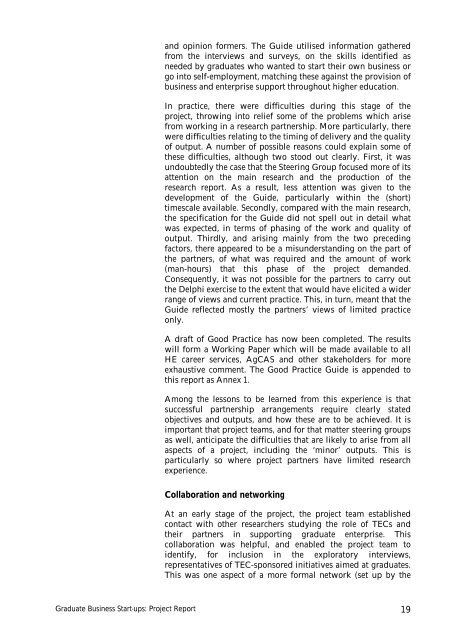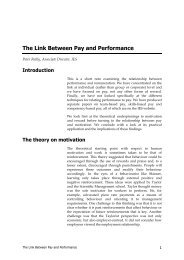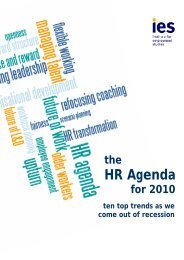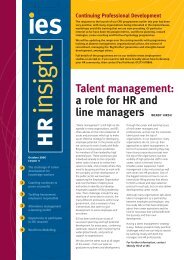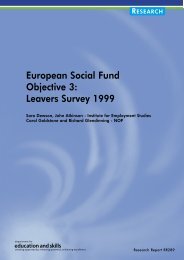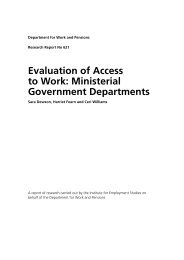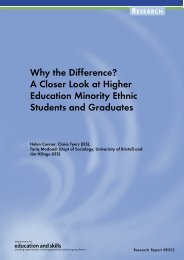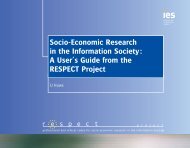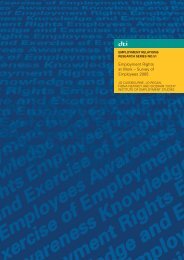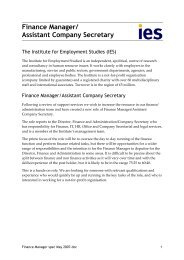Graduate Business Start-ups Project Report - The Institute for ...
Graduate Business Start-ups Project Report - The Institute for ...
Graduate Business Start-ups Project Report - The Institute for ...
Create successful ePaper yourself
Turn your PDF publications into a flip-book with our unique Google optimized e-Paper software.
and opinion <strong>for</strong>mers. <strong>The</strong> Guide utilised in<strong>for</strong>mation gathered<br />
from the interviews and surveys, on the skills identified as<br />
needed by graduates who wanted to start their own business or<br />
go into self-employment, matching these against the provision of<br />
business and enterprise support throughout higher education.<br />
In practice, there were difficulties during this stage of the<br />
project, throwing into relief some of the problems which arise<br />
from working in a research partnership. More particularly, there<br />
were difficulties relating to the timing of delivery and the quality<br />
of output. A number of possible reasons could explain some of<br />
these difficulties, although two stood out clearly. First, it was<br />
undoubtedly the case that the Steering Group focused more of its<br />
attention on the main research and the production of the<br />
research report. As a result, less attention was given to the<br />
development of the Guide, particularly within the (short)<br />
timescale available. Secondly, compared with the main research,<br />
the specification <strong>for</strong> the Guide did not spell out in detail what<br />
was expected, in terms of phasing of the work and quality of<br />
output. Thirdly, and arising mainly from the two preceding<br />
factors, there appeared to be a misunderstanding on the part of<br />
the partners, of what was required and the amount of work<br />
(man-hours) that this phase of the project demanded.<br />
Consequently, it was not possible <strong>for</strong> the partners to carry out<br />
the Delphi exercise to the extent that would have elicited a wider<br />
range of views and current practice. This, in turn, meant that the<br />
Guide reflected mostly the partners’ views of limited practice<br />
only.<br />
A draft of Good Practice has now been completed. <strong>The</strong> results<br />
will <strong>for</strong>m a Working Paper which will be made available to all<br />
HE career services, AgCAS and other stakeholders <strong>for</strong> more<br />
exhaustive comment. <strong>The</strong> Good Practice Guide is appended to<br />
this report as Annex 1.<br />
Among the lessons to be learned from this experience is that<br />
successful partnership arrangements require clearly stated<br />
objectives and outputs, and how these are to be achieved. It is<br />
important that project teams, and <strong>for</strong> that matter steering gro<strong>ups</strong><br />
as well, anticipate the difficulties that are likely to arise from all<br />
aspects of a project, including the ‘minor’ outputs. This is<br />
particularly so where project partners have limited research<br />
experience.<br />
Collaboration and networking<br />
At an early stage of the project, the project team established<br />
contact with other researchers studying the role of TECs and<br />
their partners in supporting graduate enterprise. This<br />
collaboration was helpful, and enabled the project team to<br />
identify, <strong>for</strong> inclusion in the exploratory interviews,<br />
representatives of TEC-sponsored initiatives aimed at graduates.<br />
This was one aspect of a more <strong>for</strong>mal network (set up by the<br />
<strong>Graduate</strong> <strong>Business</strong> <strong>Start</strong>-<strong>ups</strong>: <strong>Project</strong> <strong>Report</strong> 19


